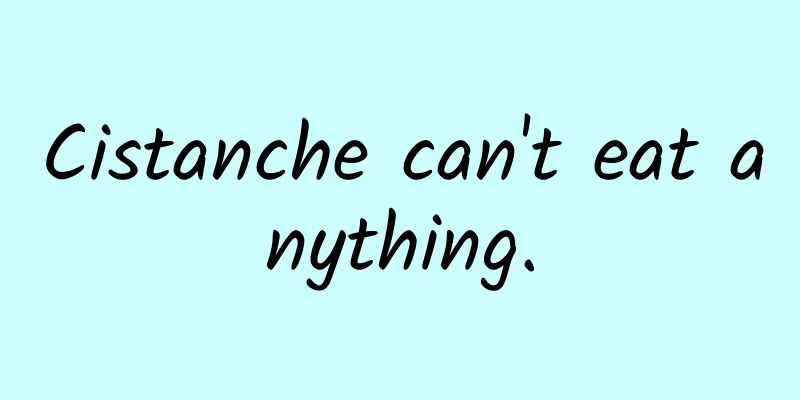The efficacy and function of Liquidambar parasiticus

|
Chinese medicinal materials have good effects on the treatment of most diseases, such as Liquidambar formosana. Below we will give a basic introduction to the relevant information about Liquidambar formosana. [Other names] Shrimp and clam grass (Compendium of Materia Medica), hundred-son phlegm stem (Lingnan Collection of Medicinal Herbs), crab claws, chestnut parasite, parasitic bag (Sichuan Chinese Materia Medica), Rhizoma Lulutongae, Rhizoma Wind Rice Parasite (Color Atlas of Commonly Used Chinese Herbal Medicines), persimmon parasite (Yunnan Chinese Herbal Medicines), flat branch parasite (Commonly Used Chinese Herbal Medicines in Tibet). [Source] It is the branches and leaves of Viscum album, a plant of the Loranthaceae family. Harvested in summer and autumn. [Original form] An evergreen parasitic shrub, 20 to 40 cm tall. The base of the stem is cylindrical with two edges; the twigs are flat and green, and each internode is rectangular, oblanceolate or nearly linear, wide at the top and narrow at the bottom, with many veins on both sides. The leaves have degenerated into scales. The flowers are unisexual and monoecious, growing in the depression above the joint, with 3 flowers in each cluster, the central one is female and the lateral ones are male flowers, with 2 bracts fused into a disc at the base of the flower; the male flowers are small, and the perianth is 4-lobed; there are 4 stamens, without filaments, and the anthers are multi-chambered, attached to the perianth; the female flowers are about 1.5 mm long; the perianth is 4-lobed, and the lobes are triangular; the ovary is inferior, and the style is short and conical. The berry is nearly ovate, about 4 mm in diameter, yellow when ripe, with persistent bracteoles at the base. Flowering period is early summer. [Habitat distribution] Parasitizes on fruit trees, liquidambar and oak trees. Distributed in Yunnan, Sichuan, Guizhou, Guangdong, Hunan, Hubei, Fujian, Taiwan and other places. [Chemical composition] Contains triterpenoid components such as oleanolic acid, oleanolic acid ester, elaiododiol and inositol. 【Nature and flavor】Acrimonious, warm. 【Functions and indications】 Dispel wind, promote blood circulation, remove dampness, relieve cough and eliminate phlegm. It is used to treat sore waist and limbs, rheumatic bone pain, cough due to overwork, dysentery, metrorrhagia, leukorrhea, postpartum blood and qi pain, and scabies. [Usage and Dosage] For internal use: decoct in water, 3-5 qian; stew with meat, 1-2 liang; or soak in wine. For external use: decoct in water for washing or grind into powder for application. [Additional prescription] ① Treat postpartum blood and qi pain: stew crab claws with fermented glutinous rice wine. (Sichuan Traditional Chinese Medicine Records) 【Excerpt】 《*Dictionary》 [Source] From "Essentials of the Properties of Raw Medicinal Herbs". The unique living environment gives Liquidambar parasiticus magical effects. After the introduction above, I believe everyone has a certain understanding. I hope that everyone can learn more about this in daily life, and while increasing experience, be able to solve the difficulties in life. |
<<: The efficacy and function of quail eggs
>>: The efficacy and function of quail
Recommend
What are the effects and functions of Momordica charantia leaves?
Some people think that Momordica charantia is a f...
[Smart Farmers] This unique "small ingot" in China is a favorite "dessert station" for migratory birds
In the cold winter, what do resident birds (as op...
What are the effects and functions of Huangqi Jianzhong Pills?
Nowadays, people are more and more health conscio...
The Webb telescope, which has been repeatedly delayed in its launch, is finally about to be launched into space. Will it become another astronomical legend?
The full name of the Webb Telescope is James Webb...
Weekly Achievements “Awards”丨“Confessions” of Scientific Climbers (Part 2)
Since the reform of the science and technology aw...
Technology Morning News | The fastest asteroid in the solar system has appeared;
【Today’s cover】 Now is the busy season for shovel...
What is Bletilla striata?
Bletilla striata is a Chinese herbal medicine, al...
La Niña may reappear. Will floods in my country increase in summer?
(Photo courtesy of TUCHONG Creative) The El Niño ...
What chemical materials are used in the epoch-making brain-computer interface?
On February 20, American entrepreneur Musk said t...
Be careful of waist aging before aging! These postures are the most harmful to waist...
Sitting for a long day at work and lying down lik...
The Yellow River has an exact birthday! Groundwater "tells" us the Yellow River's "birth story" →
Huang He finally has an accurate birthday. Chines...
The efficacy and function of rose root
Chinese medicinal materials are very effective in...
The efficacy and function of the large-leaved star fern
The medical value of the giant walnut fern is bey...
Can opening an opening in the Himalayas change the climate between China and India?
Decades ago, someone planned to blast a hole in t...
The protagonist of "The World" died of stomach cancer. What habits are harmful to the stomach? What should we do to prevent stomach cancer?
The protagonist of the hit TV series "The Wo...









